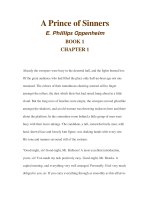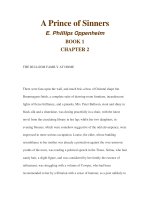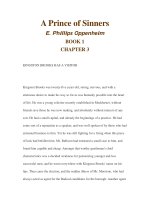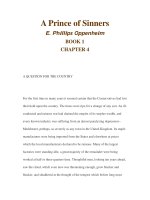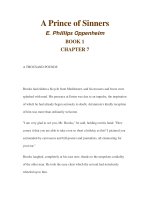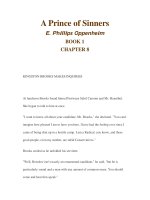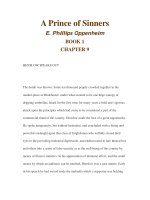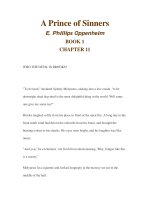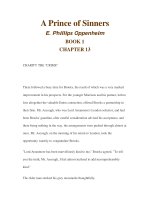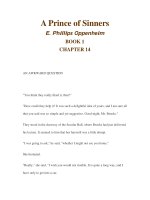A Prince of Sinners E. Phillips Oppenheim BOOK 1 CHAPTER 14 pdf
Bạn đang xem bản rút gọn của tài liệu. Xem và tải ngay bản đầy đủ của tài liệu tại đây (38.54 KB, 17 trang )
A Prince of Sinners
E. Phillips Oppenheim
BOOK 1
CHAPTER 14
AN AWKWARD QUESTION
"You think they really liked it, then?"
"How could they help it? It was such a delightful idea of yours, and I am sure all
that you said was so simple and yet suggestive. Good-night, Mr. Brooks."
They stood in the doorway of the Secular Hall, where Brooks had just delivered
his lecture. It seemed to him that her farewell was a little abrupt.
"I was going to ask," he said, "whether I might not see you home."
She hesitated.
"Really," she said, "I wish you would not trouble. It is quite a long way, and I
have only to get into a car.
"The further the better," he answered, "and besides, if your uncle is at home I
should like to come in and see him."
She made no further objection, yet Brooks fancied that her acquiescence was, to
some extent, involuntary. He walked by her side in silence for a moment or two,
wondering whether there was indeed any way in which he could have offended
her.
"I have not seen you," he remarked, "since the evening of your dinner-party."
"No!"
"You were out when I called."
"I have so many things to do just now. We can get a car here."
He looked at it.
"It is too full," he said. "Let us walk on for a little way. I want to talk to you."
The car was certainly full, so after a moment's hesitation she acquiesced.
"You will bring your girls again, I hope?" he asked.
"They will come I have no doubt," she answered. "So will I if I am in
Medchester."
"You are going away?"
"I hope so," she answered. "I am not quite sure."
"Not for good?" Possibly."
"Won't you tell me about it?" he asked.
"Well I don't know!"
She hesitated for a moment.
"I will tell you if you like," she said, doubtfully. "But I do not wish anything
said about it at present, as my arrangements are not complete."
"I will be most discreet," he promised.
"I have been doing a little work for a woman's magazine in London, and they
have half promised me a definite post on the staff. I am to hear in a few days as
to the conditions. If they are satisfactory that is to say, if I can keep myself on
what they offer I shall go and live in London."
He was surprised, and also in a sense disappointed. It was astonishing to find
how unpleasant the thought of her leaving Medchester was to him.
"I had no idea of this," he said, thoughtfully. "I did not know that you went in
for anything of the sort."
"My literary ambitions are slight enough," she answered. "Yet you can scarcely
be surprised that I find the thought of a definite career and a certain amount of
independence attractive."
He stole a sidelong glance at her. In her plainly made clothes and quiet hat she
was scarcely, perhaps, a girl likely to attract attention, yet he was conscious of
certain personal qualities, which he had realized and understood from the first.
She carried herself well, she walked with the free graceful movements of a well-
bred and healthy girl. In her face was an air of quiet thought, the self-possession
of the woman of culture and experience. Her claim to good looks was, after all,
slight enough, yet on studying her he came to the conclusion that she could if
she chose appear to much greater advantage. Her hair, soft and naturally wavy,
was brushed too resolutely back; her smile, which was always charming, she
suffered to appear only at the rarest intervals. She suggested a life of repression,
and with his knowledge of the Bullsom menage he was able to surmise some
glimmering of the truth.
"You are right," he declared. "I think that I can understand what your feeling
must be. I am sure I wish you luck."
The touch of sympathy helped her to unbend. She glanced towards him kindly.
"Thank you," she said. "Of course there will be difficulties. My uncle will not
like it. He is very good-natured and very hospitable, and I am afraid his
limitations will not permit him to appreciate exactly how I feel about it. And my
aunt is, of course, merely his echo."
"He will not be unreasonable," Brooks said. "I am sure of that. For a man who is
naturally of an obstinate turn of mind I think your uncle is wonderful. He makes
great efforts to free himself from all prejudices."
"Unfortunately," she remarked, "he is very down on the independent woman.
He would make housekeepers and cooks of all of us."
"Surely," he protested, with a quiet smile, "your cousins are more ambitious
than that. I am sure Selina would never wear a cooking-apron, unless it had
ribbon and frilly things all over it."
She laughed.
"After all, they have been kind to me," she said. "My mother was the black
sheep of the family, and when she died Mr. Bullsom paid my passage home, and
insisted upon my coming to live here as one of the family. I should hate them to
think that I am discontented, only the things which satisfy them do not satisfy
me, so life sometimes becomes a little difficult."
"Have you friends in London?" he asked.
"None! I tried living there when I first came back for a few weeks, but it was
impossible."
"You will be very lonely, surely. London is the loneliest of all great cities."
"Why should I not make friends?"
"That is what I too asked myself years ago when I was articled there," he
answered. "Yet it is not so easy as it sounds. Every one seems to have their own
little circle, and a solitary person remains so often just outside. Yet if you have
friends and tastes London is a paradise. Oh, how fascinating I used to find it
just at first before the chill came. You, too, will feel that. You will be content
at first to watch, to listen, to wonder! Every type of humanity passes before you
like the jumbled-up figures of a kaleidoscope. You are content even to sit before
a window in a back street and listen. What a sound that is the roar of London,
the voices of the street, the ceaseless hum, the creaking of the great wheel of
humanity as it goes round and round. And then, perhaps, in a certain mood the
undernote falls upon your ear, the bitter, long-drawn-out cry of the hopeless and
helpless. When you have once heard it, life is never the same again. Then, if you
do not find friends, you will know what misery is."
They were both silent for a few minutes. A car passed them unnoticed. Then she
looked at him curiously.
"For a lawyer," she remarked, "you are a very imaginative person."
He laughed.
"Ah, well, I was talking just then of how I felt in those days. I was a boy then,
you know. I dare say I could go back now to my old rooms and live there
without a thrill."
She shook her head.
"What one has once felt," she murmured, "comes back always."
"Sometimes only the echo," he answered, "and that is weariness."
They walked for a little way in silence. Then she spoke to him in an altered
tone.
"I have heard a good deal about you during the last few weeks," she said. "You
are very much to be congratulated, they tell me. I am sure I am very glad that
you have been so fortunate."
"Thank you," he answered. "To tell you the truth, it all seems very marvellous to
me. Only a few months ago your uncle was almost my only client of
importance."
"Lord Arranmore was your father's friend though, was he not?"
"They came together abroad," he answered, "and Lord Arranmore was with my
father when he died in Canada."
She stopped short.
Where?
"In Canada, on the banks of Lake Ono, if you know where that is," he answered,
looking at her in surprise.
She resumed her usual pace, but he noticed that she was pale.
"So Lord Arranmore was in Canada?" she said. "Do you know how long ago?"
"About ten years, I suppose," he answered. "How long before that I do not
know."
She was silent for several minutes, and they found themselves in the drive
leading to the Bullsom villa. Brooks was curious.
"I wonder," he asked, "whether you will tell me why you are interested in Lord
Arranmore and Canada?"
"I was born in Montreal," she answered, "and I once saw some one very much
like Lord Arranmore there. But I am convinced that it could only have been a
resemblance."
"You mentioned it before when we saw him in Mellor's," he remarked.
"Yes, it struck me then," she admitted. "But I am sure that Lord Arranmore
could not have been the person whom I am thinking about. It is ridiculous of me
to attach so much importance to a mere likeness."
They stood upon the doorstep, but she checked him as he reached out for the
bell.
"You have seen quite a good deal of him," she said. "Tell me what you think of
Lord Arranmore." His hand fell to his side. He stood under the gas-bracket, and
she could see his face distinctly. There was a slight frown upon his forehead, a
look of trouble in his grey eyes.
"You could not have asked me a more difficult question," he admitted. "Lord
Arranmore has been very kind to me, although my claim upon him has been of
the slightest. He is very clever, almost fantastic, in some of his notions; he is
very polished, and his manners are delightful. He would call himself, I believe,
a philosopher, and he is, although it sounds brutal for me to say so, very selfish.
And behind it all I haven't the faintest idea what sort of a man he is. Sometimes
he gives one the impression of a strong man wilfully disguising his real
characteristics, for hidden reasons; at others, he is like one of those brilliant
Frenchmen of the last century, who toyed and juggled with words and phrases,
esteeming it a triumph to remain an unread letter even to their intimates. So you
see, after all," he wound up, "I cannot tell you what I think of Lord Arranmore."
"You can ring the bell," she said. "You must come in for a few minutes."
Their entrance together seemed to cause the little family party a certain amount
of disturbed surprise. The girls greeted Brooks with a great show of pleasure,
but they looked doubtfully at Mary.
"Did you meet at the front door?" Selina asked. "I thought I heard voices."
Brooks was a little surprised.
"Your cousin brought her class of factory girls to my lecture to-night at the
Secular Hall."
Selina's eyes narrowed a little, and she was silent for a moment. Then she turned
to her cousin.
"You might have told us, Mary," she exclaimed, reproachfully. "We should so
much have liked to come, shouldn't we, Louise?"
"Of course we should," Louise answered, snappishly. "I can't think why Mary
should go off without saying a word."
Mary looked at them both and laughed. "Well," she said, "I have left the house
at precisely the same time on 'Wednesday evenings all through the winter, and
neither of you have said anything about coming with me."
"This is quite different," Selina answered, cuttingly. "We should very much
have enjoyed Mr. Brooks' lecture. Do tell us what it was about."
"Don't you be bothered, Brooks," Mr. Bullsom exclaimed, hospitably. "Sit down
and try one of these cigars. We've had supper, but if you'd like anything "
"Nothing to eat, thanks," Brooks protested. "I'll have a cigar if I may."
"And a whisky-and-soda, then," Mr. Bullsom insisted. "Say when!"
Brooks turned to Selina. Mary had left the room. "You were asking about the
lecture," he said. "Really, it was only a very unpretentious affair, and to tell you
the truth, only intended for people whose opportunities for reading have not
been great. I am quite sure it would not have been worth your while to come
down. We just read a chapter or so from A Tale of Two Cities, and talked about
it."
"We should have liked it very mulch," Selina declared. "Do tell us when there is
another one, will you?"
"With pleasure," he answered. "I warn you, though, that you will be
disappointed."
"We will risk that," Selina declared, with a smile. "Have you been to Enton this
week?"
"I was there on Sunday," he answered.
"And is that beautiful girl, Lady Sybil Caroom, still staying there?
"Yes," he answered. "Is she very beautiful, by the bye?"
"Well, I thought men would think so," Selina said, hastily. "I think that she is
just a little loud, don't you, Louise?"
Louise admitted that the idea had occurred to her.
"And her hair isn't it badly dyed?" Selina remarked. "Such a pity. It's all in
patches."
"I think girls ought not to make up in the street, either," Louise remarked,
primly. "A little powder in the house is all very well" (Louise had a nose which
gave her trouble) "but I really don't think it looks respectable in the street."
"I suppose," Selina remarked, "you men admire all that sort of thing, don't you?
"I really hadn't noticed it with Lady Sybil," Brooks admitted.
Selina sighed.
"Men are so blind," she remarked. "You watch next time you are close to her,
Mr. Brooks."
"I will," he promised. "I'll get her between me and a window in a strong north
light."
Selina laughed.
"Don't be too unkind," she said. "That's the worst of you men. When you do
find anything out you are always so severe."
"After all, though," Louise remarked, with a sidelong glance, "it must be very,
very interesting to meet these sort of people, even if one doesn't quite belong to
their set. I should think you must find every one else quite tame, Mr. Brooks."
"I can assure you I don't," he answered, coolly. "This evening has provided me
with quite as pleasant society as ever I should wish for."
Selina beamed upon him.
"Oh, Mr. Brooks, you are terrible. You do say such things!" she declared,
archly.
Louise laughed a little hardly.
"We mustn't take too much to ourselves, dear," she said. "Remember that Mr.
Brooks walked all the way up from the Secular Hall with Mary."
Mr. Bullsom threw down his paper with a little impatient exclamation.
"Come, come!" he said. "I want to have a few words with Brooks myself, if you
girls'll give me a chance. Heard anything from Henslow lately, eh?"
Brooks leaned forward.
"Not a word!" he answered.
Mr. Bullsom grunted.
"H'm! He's taken his seat, and that's all he does seem to have done. To have
heard his last speech here before polling time you would have imagined him
with half-a-dozen questions down before now. He's letting the estimates go by,
too. There are half-a-dozen obstructors, all faddists, but Henslow, with a real
case behind him, is sitting tight. 'Pon my word, I'm not sure that I like the
fellow."
"I ventured to write to him the other evening," Brooks said, "and I have sent him
all the statistics we promised, he seems to have regarded my letter as an
impertinence, though, for he has never answered it."
"You mark my words," Mr. Bullsom said, doubling the paper up and bringing it
down viciously upon his knee, "Henslow will never sit again for Medchester.
There was none too mulch push about him last session, but he smoothed us all
over somehow. He'll not do it again. I'm losing faith in the man, Brooks."
Brooks was genuinely disturbed. His own suspicions had been gathering
strength during the last few weeks. Henslow had been pleasant enough, but a
little flippant after the election. From London he had promised to write to Mr.
Bullsom, as chairman of his election committee, mapping out the course of
action which, in pursuance of his somewhat daring pledges, he proposed to
embark upon. This was more than a month ago, and there had come not a single
word from him. All that vague distrust which Brooks had sometimes felt in the
man was rekindled and increased, and with it came a flood of bitter thoughts.
Another opportunity then was to be lost. For seven years longer these thousands
of pallid, heart-weary men and women were to suffer, with no one to champion
their cause. He saw again that sea of eager faces in the market-place, lit with a
sudden gleam of hope as they listened to the bold words of the man who was
promising them life and hope and better things. Surely if this was a betrayal it
was an evil deed, not passively to be borne.
Mr. Bullsom had refreshed himself with whisky-and-water, and decided that
pessimism was not a healthy state of mind.
"I tell you what it is, Brooks," he said, more cheerfully. "We mustn't be too
previous in judging the fellow. Let's write him civilly, and if nothing comes of it
in a week or two, we will run up to London, you and me, eh? and just haul him
over the coals."
"You are right, Mr. Bullsom," Brooks said. "There is nothing we can do for the
present."
"Please don't talk any more horrid politics," Selina begged. "We want Mr.
Brooks to give us a lesson at billiards. Do you mind?"
Brooks rose at once.
"I shall be charmed!" he declared.
Mr. Bullsom rose also.
"Pooh, pooh!" he said. "Brooks and I will have a hundred up and you can watch
us. That'll be lesson enough for you."
Selina made a little grimace, but they all left the room together. In the hall a
housemaid was speaking at the telephone, and a moment afterwards she laid the
receiver down and came towards them.
"It is a message for Mr. Brooks, sir, from the Queen's Hotel. Lord Arranmore's
compliments, and the ladies from Enton are at the theatre this evening, and
would be glad if Mr. Brooks would join them at the Queen's Hotel for supper at
eleven o'clock."
Brooks hesitated, but Mr. Bullsom spoke up at once.
"Off you go, Brooks," he said, firmly. "Don't you go refusing an invitation like
that. Lord Arranmore is a bit eccentric, they say, and he isn't the sort of man to
like refusals. You've just got time."
"They had the message two hours ago, and have been trying everywhere to find
Mr. Brooks," the housemaid added.
Selina helped him on with his coat.
"Will you come another evening soon and play billiards with us?" she asked,
dropping her voice a little.
"With pleasure," Brooks answered. "Do you mind saying good-bye to your
cousin for me? I am sorry not to see her again."
